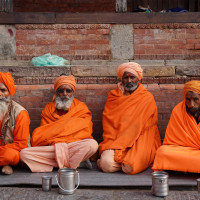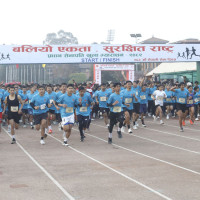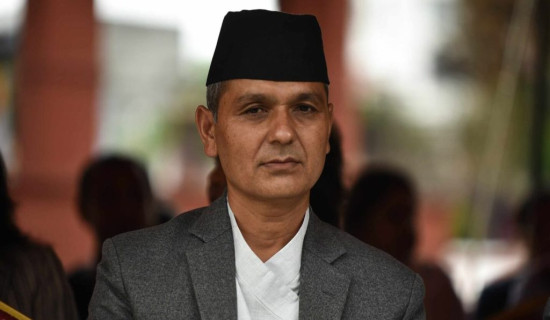- Saturday, 7 February 2026
Risk of Mpox outbreak in Nepal low: EDCD
Kathmandu, Jan. 4: Nepal has reported its third monkeypox (Mpox) case, raising concerns about the potential spread of the virus.
The latest case involves a 44-year-old migrant worker from Sindhuli district, who tested positive for the virus on December 29. He had returned from Saudi Arabia. The patient sought medical attention upon arrival on December 28. This is the second Mpox case among migrant workers returning from Saudi Arabia within nine days, following a 36-year-old man from Tanahun district who tested positive on December 20.
Nepal’s first confirmed Mpox case was reported in June 2023, involving a 60-year-old foreign national.
One patient has recovered and returned home, while the other is receiving treatment at Sukraraj Tropical and Infectious Disease Hospital (STIDH) in Teku.
The patient under care is in stable condition, confirmed Dr. Prakash Budhathoki, spokesperson for the Ministry of Health and Population.
Health experts urge vigilance
Public health experts have expressed concerns over the risk of community transmission due to the high number of international travellers, including migrant workers, entering Nepal daily.
Dr. Sher Bahadur Pun, Chief of the Clinical Research Unit at STIDH, explained that Mpox, a zoonotic disease caused by the Monkeypox virus, is part of the orthopoxvirus family, which includes the smallpox-causing Variola virus.
“Symptoms of Mpox include fever, headache, muscle aches, swollen lymph nodes, pus-filled blisters and exhaustion. Although milder than smallpox, Mpox remains a significant public health concern,” said Dr. Pun.
He highlighted that the similarity of Mpox symptoms to those of smallpox often confuses, delaying diagnosis and treatment. “For instance, the migrant worker from Tanahun initially believed he had smallpox,” Dr. Pun noted.
Dr. Pun further warned that individuals in the incubation period or those asymptomatic could unknowingly spread the virus, especially given the influx of travellers from affected countries.
Transmission and prevention
According to the World Health Organisation (WHO), Mpox primarily spreads through close physical contact, including sexual activity, as well as exposure to an infected person’s lesions, body fluids, respiratory droplets or contaminated materials such as bedding and clothing.
While there is no specific treatment for Mpox, patients receive symptomatic care, said Dr. Pun, adding, “Vaccines are available, but they are currently limited to countries where the disease is widespread.”
Risk mitigation measures
The Epidemiology and Disease Control Division (EDCD) has assured the public that there is no immediate risk of an epidemic in Nepal.
“Confirmed cases are limited to travellers and migrant workers returning from disease-hit countries. Mpox is not as contagious as the coronavirus,” said EDCD Director Dr. Yadu Chandra Ghimire.
However, Dr. Ghimire emphasised the importance of surveillance and preventive measures. The EDCD is actively monitoring passengers at international airports, operating health desks and raising awareness about Mpox transmission.
Although no cross-border travel restrictions are required, arrangements are in place to isolate and treat symptomatic individuals, he said.
Dr. Ghimire urged the families of travellers returning from affected countries to exercise caution, as the highest risk of transmission occurs among close contacts.
He also noted that large-scale community awareness campaigns are unnecessary at this stage to avoid public panic.
“However, if Mpox cases rise in neighbouring India, Nepal will strengthen surveillance and establish health desks at border points,” he said.
Government and international collaboration
Minister for Health and Population Pradip Paudel reassured the public about the government’s commitment to preventing Mpox transmission.
He recently convened an emergency meeting with officials of Tribhuvan International Airport, urging intensified efforts to curb the spread of the virus.
The Ministry is also collaborating with the Nepali Embassy in Saudi Arabia to raise awareness within the Nepali community, particularly given the link between many infections and returnees from Saudi Arabia.
Public health experts stress the need for individuals displaying symptoms to self-isolate and practice good hygiene to minimise the risk of transmission.
















